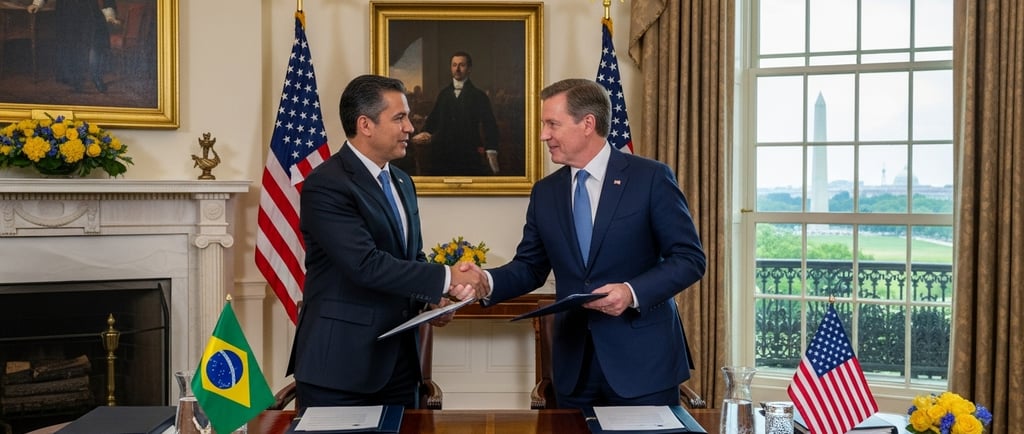Brazil's Foreign Minister Meets Marco Rubio at White House to Negotiate Trump's Tariffs
If you've been following the escalating trade tensions between the United States and Brazil, today's meeting at the White House is a big deal. Brazil's Foreign Minister Mauro Vieira sat down with US Secretary of State Marco Rubio on Thursday afternoon (October 16th) to tackle some seriously thorny issues.
Cristian Ianowich
10/16/20255 min read


High-stakes diplomatic meeting addresses trade tensions, Venezuela crisis, and geopolitical alignment
If you've been following the escalating trade tensions between the United States and Brazil, today's meeting at the White House is a big deal. Brazil's Foreign Minister Mauro Vieira sat down with US Secretary of State Marco Rubio on Thursday afternoon (October 16th) to tackle some seriously thorny issues.
The main topic? Trump's controversial tariffs against Brazil—but that's just the beginning of what's on the table.
Let me walk you through why this meeting matters, what's at stake, and how it could affect not just Brazil-US relations, but the entire geopolitical landscape of Latin America.
What's Behind This Critical Diplomatic Meeting?
The meeting, which began at 3 PM Brasília time, takes place against a backdrop of mounting economic and political tensions between the two largest economies in the Americas.
Here's what makes this encounter so significant: it's not just about economics. This is a multidimensional negotiation covering:
Trade tariffs and economic relations
The Venezuela crisis and potential Brazilian mediation
China's growing influence in Latin America
Brazil's position on de-dollarization through BRICS
The ongoing Ukraine conflict
That's a lot to unpack in one afternoon. But for anyone interested in international relations, economic policy, or Latin American geopolitics, each of these topics could have far-reaching consequences.
Trump's "Tariff Bomb" Against Brazil
The elephant in the room—or should we say, the tariff in the room—is President Trump's aggressive trade stance toward Brazil.
These aren't minor adjustments we're talking about. Trump has threatened significant tariffs that could:
Disrupt billions of dollars in bilateral trade
Affect Brazilian exports ranging from steel to agricultural products
Create retaliatory pressure on US companies operating in Brazil
Reshape supply chains throughout the Americas
Brazil's strategy? Come prepared with expert negotiators.
Minister Vieira brought three heavyweight auxiliaries to the meeting:
Maria Luiza Viotti - Brazil's Ambassador to the United States
Maurício Lyrio - Secretary of Climate, Energy and Environment
Philip Fox-Drummond Gough - Secretary of Economic and Financial Affairs (Ambassador)
The inclusion of Lyrio and Fox-Drummond Gough signals Brazil's intention to focus heavily on commercial issues. These two are considered among Brazilian diplomacy's top trade negotiators—you don't bring them unless you're ready to get serious about deals.
Understanding how trade negotiations work at the highest levels can help you anticipate market movements and position your investments accordingly. These diplomatic chess moves often signal policy shifts weeks before they're officially announced.
The Venezuela Factor: Could Brazil Become a Mediator?
According to CNN analyst Caio Junqueira, depending on how the conversation between Vieira and Rubio unfolds, Brazil may offer to mediate tensions between Venezuela and the United States.
This is fascinating territory. Here's why:
The Trump administration has been ratcheting up pressure on Nicolás Maduro's regime, even authorizing CIA operations in Venezuela. Meanwhile, Brazil maintains diplomatic relations with Venezuela while also acknowledging the legitimacy of US concerns about democracy and human rights.
This puts Brazil in a unique position—potentially acceptable to both sides as an honest broker.
What About Military Action?
Sources from Brazil's Presidential Palace (Palácio do Planalto), the Foreign Ministry (Itamaraty), and the Armed Forces told CNN they consider US military action against Maduro's regime unlikely.
This assessment matters because it suggests Brazil believes there's still diplomatic space to work with—that we haven't reached a point of no return.
If Brazil successfully positions itself as a mediator, it could:
Enhance its regional leadership role
Gain diplomatic leverage with Washington
Help prevent a potential humanitarian crisis
Demonstrate soft power effectiveness
For investors and business leaders, Brazil successfully mediating this crisis could signal enhanced regional stability—always a positive for markets and long-term planning.
The BRICS Elephant: De-Dollarization vs. Trump's Dollar Dominance
Here's where things get really interesting—and potentially contentious.
Brazil, as a BRICS member (Brazil, Russia, India, China, South Africa), supports the bloc's de-dollarization movement—essentially reducing global dependence on the US dollar for international trade.
Trump, however, is vehemently opposed to any challenge to dollar dominance.
This isn't just theoretical economics. De-dollarization efforts include:
Creating alternative payment systems
Conducting bilateral trade in local currencies
Establishing non-dollar commodity pricing
Building financial infrastructure independent of US control
For the United States, dollar dominance is both an economic tool and a geopolitical weapon. It allows:
Easier enforcement of sanctions
Lower borrowing costs for the US government
Significant influence over global financial flows
Preservation of "reserve currency" privileges
You can see the collision course here. Brazil wants more financial independence; Trump wants continued dollar supremacy.
How will they square this circle? That's the billion-dollar question, and the answer will shape global finance for decades.
Beyond Tariffs: Ukraine, China, and Global Realignment
The agenda doesn't stop at Venezuela and BRICS. The meeting is also expected to touch on:
Ukraine Conflict
Brazil has maintained a relatively neutral stance on the Ukraine war, frustrating Western allies but maintaining relationships with all parties. The US likely wants Brazil to take a clearer position supporting Ukraine.
China Relations
As China becomes Brazil's largest trading partner, the US grows increasingly concerned about Beijing's influence in Latin America. Rubio will almost certainly press Vieira on this.
Geopolitical Alignment
Ultimately, the US wants to know: Is Brazil a reliable partner in the Western hemisphere, or is it drifting toward a multi-polar world order that diminishes American influence?
These aren't small questions. The answers will shape hemispheric politics for years to come.
Why This Meeting Sets the Stage for Lula-Trump Summit
Brazilian officials view this Vieira-Rubio meeting as crucial groundwork for an eventual face-to-face meeting between President Luiz Inácio Lula da Silva and President Donald Trump.
That higher-level summit—still without a confirmed date—will be where the real deals get done. But you can't have successful presidential diplomacy without first establishing the parameters at the ministerial level.
Think of today's meeting as the reconnaissance mission before the main battle. Vieira and Rubio are:
Testing each other's negotiating flexibility
Identifying areas of potential agreement
Flagging issues that require presidential-level attention
Building personal rapport that facilitates future negotiations
According to Brazilian Finance Minister Fernando Haddad, Mauro Vieira is confident heading into this meeting—a positive signal that Brazil believes it has cards to play.
For anyone interested in international business or emerging markets, understanding these diplomatic dynamics is essential. Trade deals, investment flows, and market access often hinge on relationships built in rooms like this one.
What's at Stake for Both Countries?
Let's be clear about what success or failure in these negotiations means:
For Brazil:
Economic: Avoiding damaging tariffs that could hurt key export industries
Political: Maintaining regional leadership without alienating Washington
Strategic: Balancing relationships with the US, China, and other BRICS nations
For the United States:
Economic: Securing better trade terms and reducing bilateral deficit
Political: Keeping Brazil aligned with Western interests
Strategic: Countering Chinese influence in America's backyard
The stakes are high enough that both sides have strong incentives to find common ground—but also clear limits on how far they can compromise.
The Bottom Line: Diplomacy in a Multipolar World
Today's meeting between Mauro Vieira and Marco Rubio represents more than just a routine diplomatic encounter. It's a microcosm of the larger realignment happening in global politics.
Brazil is trying to navigate a world where it can't (and doesn't want to) choose between China and the United States. America is trying to maintain hemispheric influence while dealing with a more assertive, independent-minded Brazil.
The outcome of these negotiations will affect:
Trade flows worth billions of dollars
Regional stability in South America
The future of US-Latin America relations
Brazil's role in global governance structures
Investment climates throughout the hemisphere
Whether you're an investor, business owner, or simply someone interested in global affairs, understanding these diplomatic dynamics gives you an edge in anticipating what comes next.
The world is becoming increasingly multipolar, and meetings like this one show us how emerging powers like Brazil are navigating that new reality—carefully balancing relationships, protecting national interests, and trying to avoid being forced into binary choices.
Ready to understand the forces shaping tomorrow's global economy? The difference between those who profit from geopolitical shifts and those caught off guard often comes down to one thing: knowing how to read the signals from meetings exactly like this one.
Whatever gets decided in that White House meeting room today will ripple through markets, boardrooms, and diplomatic circles for months to come. And now you know what to watch for.
